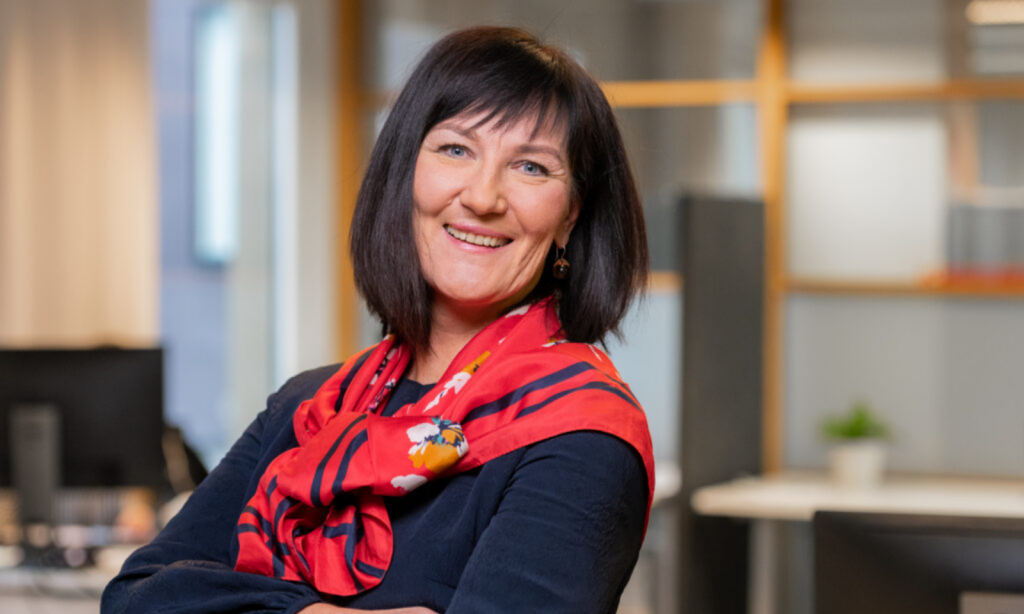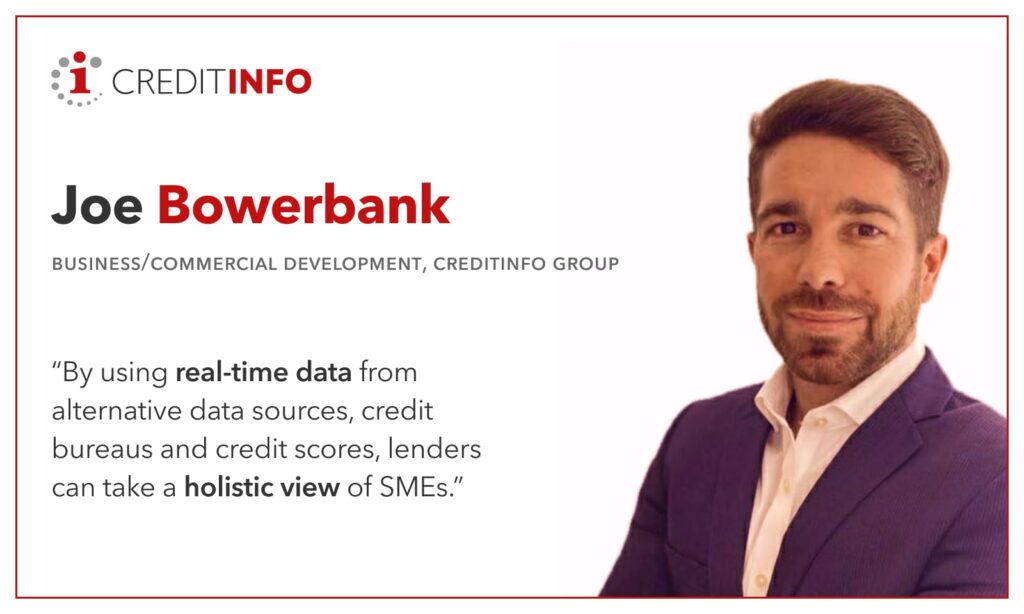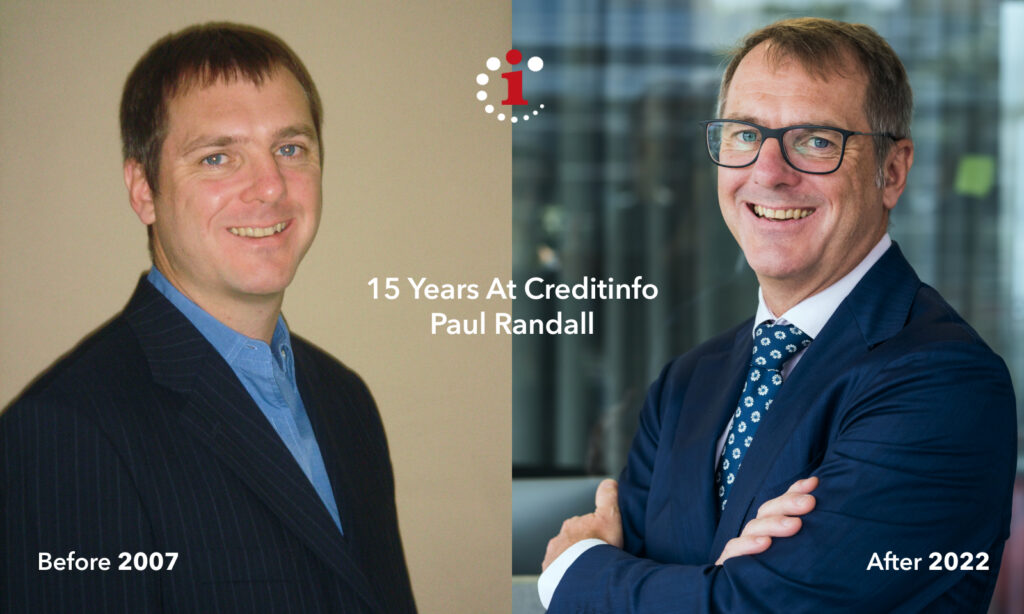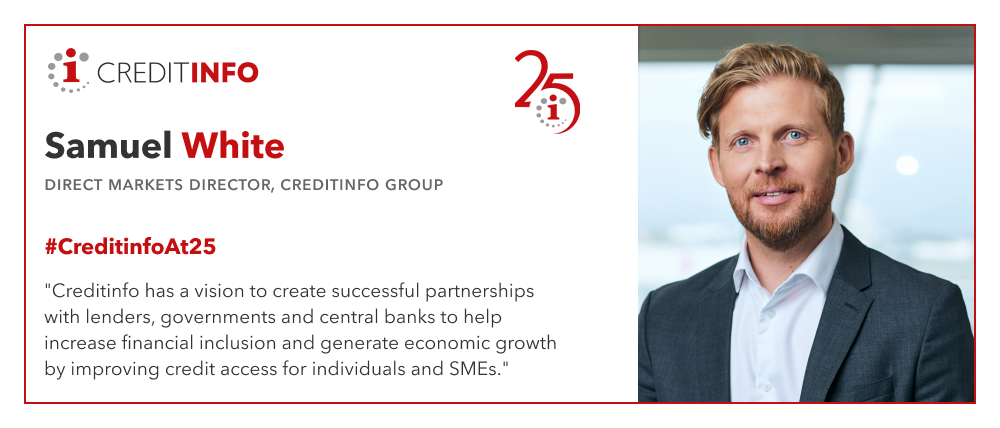Creditinfo Estonia Management Change

EXTERNAL ANNOUNCEMENT
07/02/2023
Ms. Ege Metsandi, CEO and Chairman of the Management Board for Creditinfo Estonia is leaving her position at the company. During the next 6 months, Ms. Metsandi will be working closely with the interim Chairman and CEO, Mr. Elari Tammenurm, currently the Head of IT – Baltics, along with the Estonian team to ensure a seamless handover continues until a replacement is found.
Paul Randall, Group CEO for Creditinfo, advised, “During her 6 years of tenure, Ege has successfully developed the company, both financially and commercially. I want to personally thank Ege for her efforts, utilizing her experience and great insight in risk management to build the Creditinfo brand in Estonia.
Everyone at Creditinfo wishes Ege well for her future.” Ege added, “I leave a very strong and talented team behind at Creditinfo. I look forward to making certain of a smooth transition to keep up the positive momentum that we have established together over the last 6 years.” Established in 1997, Creditinfo Group provides credit information and automated risk management services around the world.
The Know Your Customer (KYC) world and Creditinfo’s role in it.

The acronym KYC stands for three very simple and understandable words – Know Your Customer. But the meaning of the processes and expectations behind those three letters are most often not so simple and straightforward, as whoever must deal with this today already well-known acronym, knows that the world and the industry behind this magical acronym, is already vast and growing every day.
KYC in very essence means that you must have understanding and information of the background of your customer. Often this information is divided into three basic categories:
- Identification of the persons connected or operating behalf the customer.
- The field of activity or daily business including the understanding of the origin of the customers funds.
- The understanding if customer possesses certain risks while having any business relationships with him.
Mainly this sort of detective work is required in the purpose of mitigation the risks in anti-money-laundering/fight against terrorism financing (AML/CTF) but it is also relevant in the process of imposing international sanctions as sanctioned persons are interested that their business interest would remain undiscovered.
Even companies that are not subject to AML regulation need to ensure that they stay out of trouble caused by risks that are risen because of partners or clients with fraudulent, criminal, or sanctioned background, as this may result with loss of revenues/funds, bad business reputation or fines by authorities.
So therefore, it is essential for market entities to trust their business affiliates and therefore they need to verify that everything is OK with their customers and threat of the damage caused by realization of different risks, is minimized.
What is happening in Europe to strike this conversation now?
One very practical side for knowing your customer is to be sure that you’re not violating any sanctioning regime in force. Sanctions and sanctioning regimes may not be familiar to all of us who we just are involved our day-to-day business, but this obligation is something we all must know and follow. International sanctions are seen as sort of political means for influencing certain group of entities, jurisdictions, or organizations to behave in line to accordance with the international human rights, rules of law and territorial integrity. Sanctions are imposed in a way that all private and legal entities are obliged to fulfill them, authorities who are imposing them are usually international organizations (EU, UN) or state governments.
As Russia launched massive war campaign in Ukraine in February 2022 and has performed several actions against Ukraine’s territorial integrity already from year 2014 this kind of behavior has naturally found a reflection from EU by imposing sanctions. As from 2014 there was already two regimes in force (regulations EU No 269/2014 and No 833/2014) it was easy on 2022 to EU to add several sanctioning updates (altogether by 8 packets) against Russia (and Belarus).
As the conflict remains in Ukraine and also as there are several war crimes discovered performed by Russian troops during the occupation of Ukraine, we can be more than certain that EU will impose more updates to Russian sanctioning regimes. This only intensifies the need for market entities to have a clear understanding on what are the situation regarding the restrictive measures in force and where to find that information.
How is CREDITINFO playing a role in this?
Mitigating the risks is always the question of having updated and trustworthy information that person must have for making decisions and enforcing correct procedures. Regarding risk mitigation and imposing enforced sanctioning regimes clients often face themselves in front of different questions –
- What exactly do they have to do?
- How do they do it?
- Where can they find help and trustful partner for this?
- Are the solutions for doing it comfortable and simple to use?
- How expensive is it?
Providing both, the trustworthy information from respectful sources and the solution for being compliant in the regards to that obligation (by using Creditinfo-offered solution) is one of the ways of building up successful client relationship in KYC sector (obligations in KYC area may differ depending on the AML/TFC and imposing sanctions viewpoint). KYC procedures regarding sanctions can be divided into two different service blocks:
- Identifying the persons behind and connected to legal entity.
- Easy to use, reliable screening solution for determining whether there are imposed sanctions or not.
It is important to have flexible products in place for meeting the needs for most of the market entities as clients tend to prefer to order all the solutions from one place. For example, clients may have the need only for determining certain persons connected with legal entities (like UBO’s), other clients may only need data sources for setting up internal screening procedures for their inter-company use, while others are just willing to outsource everything (analysis, data and screening).
Lastly, instead of being in the last mile lets be the first! As already mentioned, there are different market entities who are operating in KYC business, and they are all seeking for cost efficient and trusted data sources for providing best data quality with best price to their customers. Creditinfo Group’s presence in several different countries, with the direct access to local state registry information or other base data source in those countries therefore makes us one of the trusted partners for well-known global companies.
KYC products are in process of continuous development and as the needs for our clients change, we need to align our services accordingly. If there are ideas, proposals, or questions, please feel free to reach me via email – urmas.pai@creditinfo.com
Urmas Pai
KYC & Fraud Global Product Manager
Creditinfo launches ESG Data Platform

Reykjavík / London, 20th October 2022 – Creditinfo Group, the leading global service provider for credit information and risk management solutions, has today announced the launch of VERA, a new environmental, social and corporate governance (ESG) data platform. The pioneering platform will provide financial services with a standardised overview of their ESG performance, helping them comply with ESG regulation, and will also create a way for other organisations to easily provide sustainability data to the financial sector.
VERA is a centralised platform that congregates information from a range of sources, including data directly reported by companies as well as external sources such as media coverage, judicial information, and supply chain operations. The information is then automatically standardised to allow organisations across financial services to obtain a holistic overview of ESG factors and performance, and easily establish how best to comply with regulation.
Initially being rolled out in Iceland, with other regions to follow globally, the platform can also be used by non-financial corporations when conducting supplier assessments to determine the ESG performance of their supply chains, and to provide sustainability data in a standardised way to the financial sector, helping to attract investment.
Reynir Smári Atlason, Director of sustainability at Creditinfo said: “Providing ESG information to financial services strengthens the presence and engagement of financial institutions – especially in markets where sustainability data is generally limited. It’s not only an ethical decision but a practical one – various markets don’t have the regulations in place to hold companies to account, yet ESG data is needed if they’re going to attract investment through sustainable financing. We’re really proud of how this platform levels the playing field and makes this information accessible and digestible.”
The VERA platform comes on the heels of Creditinfo’s own sustainability policy as the next step in its overall ESG strategy. Creditinfo’s aim to facilitate better decision making in financial services and enable greater access to finance for underserved SMEs, companies and individuals without credit ratings means it plays a vital role in social sustainability globally, and transparency in its environmental and social dealings across its regions must be a fundamental part of this.The next step will see the company publish its inaugural sustainability report evaluating performance areas against its sustainability policy in 2023.
Paul Randall, CEO at Creditinfo said: “Our ESG data platform and sustainability policy are just the first steps in understanding and addressing our wider external impact and helping others to do the same. Not only do we need to make sure we comply with regulation in this area, but the responsibility also lies with individual companies to be proactive when it comes to innovating in a sustainable and responsible way. We’re ready to lead by example here and I’m very excited by our ESG data platform and sustainability policy to ensure Creditinfo and other financial services are on track and compliant with regulation.”
Creditinfo’s sustainability policy can be found in full here.
ENDS
About Creditinfo
Established in 1997 and headquartered in London, UK, Creditinfo is a provider of credit information and risk management solutions worldwide. As one of the fastest-growing companies in its field, Creditinfo facilitates access to finance, through intelligent information, software and decision analytics solutions. With more than 30 credit bureaus running today, Creditinfo has the most considerable global presence in this field of credit risk management, with a significantly greater footprint than competitors. For decades it has provided business information, risk management and credit bureau solutions to some of the largest, lenders, governments and central banks globally to increase financial inclusion and generate economic growth by allowing credit access for SMEs and individuals. For more information, please visit www.creditinfo.com
JSC “International Bureau of Credit Histories” launched the chatbot “MBKI online” in order to provide Ukrainians and migrants from Ukraine with access to their credit histories.

Lending is one of the main elements of the modern financial system. In one way or another, most people rely on loans from banks – whether these are credits, mortgages, installments, credit cards to pay for critical goods and services. An important role in this process is played by credit bureaus that collect, store, process and transmit information on borrowers’ payment discipline, credit scoring and current obligations.
However, when people move to a new country or are forcibly evicted from their homes due to occupation or fleeing war – this is what many Ukrainians are currently experiencing – it becomes much more difficult to access financial and other services. This unfortunately disadvantages refugees and adds to the problem regardless of whether they had good or bad credit history before.
Aiming to resolve issues related to solvency confirmation of the tenant from Ukraine and checking the credit history of Ukrainians when applying for a loan or employment, JSC “IBCH” (one of the largest Credit History Bureaus in Ukraine, a member of the international Creditinfo Group since May 2021) created the “MBKI online” chatbot.
For more than 16 years IBCH (Creditinfo Ukraine) has been cooperating with the largest banks and non-bank financial institutions, including foreign financial institutions and credit bureaus of other countries. The organization is now focusing its attention on supporting Ukrainians, both in Ukraine and abroad, with getting access to credit reports.
Kateryna Danylchenko, CEO of JSC “IBCH” (Creditinfo Ukraine), stated, “Since the beginning of the war in Ukraine, over 6 million people – including myself, my fellow colleagues and partners– have been forced to leave the country at short notice with no idea if or when they will return. Displaced Ukrainian refuges face a whole host of challenges without necessary documentation or access to registries. While JSC “IBCH” (MBKI, Creditinfo Ukraine) became the first Ukrainian bureau to launch cross-border data sharing with bureaus from 5 countries, it is also important to assure easy and mobile direct-to-consumer gate to credit history reports. “MBKI online” is so important in helping Ukrainians staying in country and abroad gain online access to their credit histories (also in English), so they can prove their ability to make payments on time to landlords or new employers, follow their credit history updates and bureau score change, as well as to report about lost identification documents.”
“Creditinfo was set up to aid financial inclusion through making credit information more easily accessible and digestible for borrowers and lenders.” – comments Paul Randall, CEO Creditinfo Group. “I’m so glad that there’s something practical we’ve been able to do to help Ukrainian refugees across Europe to access financial services. The creation of this chatbot is an important development in our journey to make the lives of everyone forcibly displaced by this war that tiny bit easier.”
The “MBKI online” chatbot, available on Viber and Telegram, gives Ukrainians access to their own credit history and offers an easy way of identification including using BankID.
Chatbot enables the customer:
• To get a certificate about credit history (in Ukrainian and English);
• To find out personal credit score;
• To get answers to basic questions about credit history;
• To inform the Bureau about the loss of a passport or other identity document;
• To ask for a loan and find out available offers.
Chatbot accepts different payment methods (including bank card, Apple Pay and Google Pay). For more information and to start working with the service, follow the link: https://credithistory.com.ua/bots/
Evolution of customer onboarding and risk assessment

This year, Creditinfo celebrated its 25-year anniversary, so I decided to look back on how the landscape in effective credit risk management has evolved.
While it was a little before my time, I’m sure there are still many people today who remember that the only way to open a bank account, apply for a loan or to be considered for a mortgage was to visit your local branch and sit with a loan officer. Though, this is still the case in many emerging markets even today, there will be some small differences on the data used and the risk assessment criteria that is in place.
Historically, a visit to the branch would involve meeting a loan officer who would then try to understand your circumstances before making an approval. If there was a past relationship or a connection (family member, friend, etc) with the loan officer, this would usually work in your favor. It was a direct relationship that usually lasted a lifetime. The loan officer would know or at least try to understand as much personal information on your employment, income, and expenses as possible and then would make a personal judgement to provide you with a form of credit. All of this was most likely completed and documented on papers and filed into a filing system for record.
Fast forward a few decades and not only are local branches disappearing, but also the idea of sharing personal information with a “stranger”, along with any supporting documents that validate your circumstances are a thing of the past. In a world of smartphones, tablets, and access to the internet 24/7, we have moved to a new wave of digital lending.
Lenders are implementing new strategies today to meet the end needs of customers by enabling access to credit instantly at their fingertips. Digitalization has become the new norm in lending and to succeed today, lenders need to adjust and transform their platforms. It is now a thing of the past to fill in an application form on paper when we have a smartphone in our pockets that can allow us to fill in the same information into a mobile application within a few minutes. As part of the loan onboarding, we can now validate our identity through biometric authentication options – fingerprint analysis, selfie/face recognition and document validation, etc. eliminating the need to do human to human verification.
The challenges from old-fashioned lending methods, i.e. understanding family ties or seeking information on employment and income would typically result in an unfair and inaccurate risk assessment. With the vast amount of information available today, either traditional or non-traditional, we can accurately assess everyone, even customers with limited credit history – “thin files”. These are often rejected due to the lack of evidence on how risk-tolerant or risk-averse they are. Usually, the absence of traditional information for these customers creates a challenge for them to receive the financial support they need. With the introduction of psychometric data, e-wallet data or open banking solutions, lenders can combine credit scoring methods with traditional models to provide accurate and reliable risk assessment.
The benefits and success of this digital transformation and innovative approach to lending is not just about delivering quick-fix money solutions. Instead, it is about empowering individuals, facilitating access to credit and growing our global economies.
If you are interested to reach the top and win the digital race with a state-of-the-art digital lending platform then reach out to Gary Brown, Commercial Director, Creditinfo Group.
Visit www.creditinfo.com for more information.
Paving the way for a brighter future through SME lending

Developing modern solutions and removing barriers, paves the way for a brighter future through SME lending
SMEs (Small and Medium-sized Enterprises) are known as one of the biggest business sectors in each economy, being important contributors to job creation and global economic development. They create more than 50% of employment worldwide.
SMEs have gained importance in developing economies. Although SMEs have some weaknesses, they are less affected by economic crises due to their flexibility and ability to keep up with changing conditions. SMEs are vital establishments to create an effective innovation ecosystemThis is shown by recent studies that SME’s can contribute to over 55% of GDP and over 50% of total employment.
SMEs can find it increasingly difficult to borrow money from traditional banks because of strict requirements. It is often seen that SMEs are riskier than large institutions as it is difficult for banks to evaluate them in the same way since they often do not have solid accounting systems. This difficulty in assessing their creditworthiness often impacts the bank’s ability to provide affordable credit. As a result, many SMEs are forced to look at alternative solutions such as expensive credit lines charging high interest rates or offering costly collateral. Neither of these options are sustainable for small businesses.
SMEs need fast decisions and a more agile, digital approach. This is where Creditinfo and local Fintechs are working in collaboration to support the sector. Together, we specialize in using technology to quickly assess each SME’s entire data footprint and then provide tailored financial solutions. Based on our experience in Africa, we can assess the credit risk an SME poses by using real-time data from multiple sources, including e-wallets, credit bureaus and credit scores. The traditional method, consisting of manual processes and hard copies, is now an outdated approach in the digital world.
Digital SME finance, using alternative data, offers an extraordinary opportunity for addressing some of the challenges. Every time SMEs and their customers use digital services, conduct banking transactions, make or accept digital payments, use their mobile phones, or manage their receivables and payables through a digital platform, they create alternative data. This real-time and verified data can be analyzed to determine both capacity and willingness to repay loans.
Specific SME assessment methodology can also be applied. For example, small companies tend to have a greater level of owner centricity. Therefore, blending business and personal data can enable the development of highly predictive blended scorecards that utilize the payment behaviour of business owners and managers and company credit data to produce a more comprehensive risk assessment.
Help is also needed from Central Banks to continue to support this sector. We are seeing reforms happening globally where Central Banks are implementing mandates for all banks to lend a set percentage of their credit portfolios to SMEs. Boosting the availability of finance for the SME sector, the reforms aim to ease the flow and reduce the high cost of credit to a sector that is considered an engine of growth for the future.
SME lending is rapidly growing, and by putting the customer needs first and using new solutions and data, we can begin to shift the status quo. Globally there is a shift toward digital lending solutions, which can support a level playing field for SMEs. By transforming this lending sector as a whole, we can make it more accessible for small businesses to grow and continue making a difference.
Joe Bowerbank – Business/Commercial Development, Creditinfo Group.
Angola’s first licensed credit bureau in partnership with Creditinfo to provide millions with access to finance

- Private credit bureau will support responsible lending and economic growth
- Millions of unbanked citizens and small businesses to gain access to lending for the first time
Luanda/London, 16th May 2022 – Creditinfo Group, the leading global service provider for credit information and risk management solutions, today announces plans to open Angola’s first licensed credit bureau, with Bureau Central Privada de Informação de Crédito SA (Bureau). This long-term strategic partnership, represents a vote of confidence and major investment into Angola’s buoyant economy, unlocking access to credit for millions of micro-to-medium sized businesses and citizens – many of whom are currently unbanked.
To deliver a world-leading private credit bureau solution, Creditinfo will combine Bureau‘s local knowledge with its own extensive experience delivering private credit bureau solutions in developing markets – including across Sub-Saharan Africa. The project’s initial remit will include Creditinfo’s most popular products and services, including CBS. Based on market appetite, further value-added products will be introduced.
Samúel White, Regional Director at Creditinfo said: “Accessing credit has long been a challenge across Sub-Saharan Africa. By opening Angola’s first private credit bureau, we’ll enable banks and other lenders to extend credit to citizens and businesses, helping to build and develop its already thriving economy. Supporting the unbanked to access finance requires a specific set of experiences and insights which Creditinfo has honed over decades of working across the region. We’re proud to be a leader in this space and can’t wait to open for another dynamic market together with our strategic partners.”
Cristiano Monnerat, Director at Bureau Central Privada de Informação de Crédito S.A. added: “Boasting significant untapped opportunities for wealth creation and a young, dynamic population, Angola represents an attractive investment for us. As such, we’re excited to be able to draw on Creditinfo’s global expertise to build a private credit bureau that’s run by local people, for local people. All in all, this marks a major step forward for Angola’s growing economy.”
-ENDS-
About Creditinfo
Established in 1997 and headquartered in Reykjavík, Iceland, Creditinfo is a provider of credit information and risk management solutions worldwide. As one of the fastest-growing companies in its field, Creditinfo facilitates access to finance, through intelligent information, software and decision analytics solutions.
With more than 30 credit bureaus running today, Creditinfo has the most considerable global presence in this field of credit risk management, with a significantly greater footprint than competitors. For
decades it has provided business information, risk management and credit bureau solutions to some of the largest, lenders, governments and central banks globally to increase financial inclusion and generate economic growth by allowing credit access for SMEs and individuals. For more information, please visit www.creditinfo.com
About Bureau Central Privada de Informação de Crédito S.A.
Established in 2021, the Bureau Central Privada de Informação de Crédito S.A. (Bureau) supports access to finance in Angola – with a focus on underserved segments of society with no formal access to credit facilities. Bureau is led by a highly qualified team of Brazilian advisors based in Angola. In February 2022, the Bureau received its operational license from the Central Bank of Angola, fulfilling all of the legislative and regulatory requirements.
The long-term strategic partnership with Creditinfo Group will provide Bureau with the necessary insights and industry best practices from similar markets to increase economic growth and improve financial inclusion across Angola.
Media Contacts:
Jack Benda
Red Lorry Yellow Lorry for Creditinfo Group creditinfo@rlyl.com
+44 (0)7760 291 679
Paul Randall marks 15 years at Creditinfo Group

We recently sat down with our CEO, Paul Randall and asked him 15 questions to mark his 15 years at Creditinfo Group. Get to know a little more about Paul as he celebrates this milestone:
- Describe yourself in 3 words? Competitive. Curious. Optimistic.
- What was your first job? JD Williams in Manchester -a clothing retail outlet that sold clothes on credit.
- How many countries have you worked in? Over 50 countries and counting.
- How long have you worked in the credit industry? Over 35 years; not only just the credit industry, but also in telcos, retail, and utilities.
- What has been your most shocking discovery working in this industry so far? I think some of the practices on collections. I feel that collections processes need to be more humane. There is also the fact that there are additional costs to customers particularly those who are borrowing short term. There is a place for short term lending, which has a higher cost than low risk lending, however this needs to be done fairly.
- What has been your highest moment working at Creditinfo Group? Meetings with central banks particularly in West Africa in Senegal. The BCEAO is very prestigious organization, which is very well respected, and for us to demonstrate that we could provide meaningful services to that region, was very important. Other great moments were winning major tenders with organizations such as Pefindo and Safaricom.
- Out of all the markets we are present in, which one intrigues you the most and why? So many markets intrigue me in different ways. I think the variety is what intrigues me the most – working from SME’s, business lending, all the way to trade credit, and everything in between.
- Working at Creditinfo opens doors to meeting a lot of personalities to look up to. Who have you met so far that has influenced your career? There are a number of personalities in the in industry that I’ve met and worked with. I have been lucky to have had a lot of good leaders. I have also learnt from team members, that gave me important feedback. When I was in banking, I had a risk management director Caroline Hendra, who was really inspiring as she went into a very male dominated banking environment in the 90’s, and through her intelligence, she transformed the business. Graham Platts, was also a big influence in terms of understanding of risk management and credit scoring. When I was at Experian, Mark Gaudart made it clear that it’s not only about having knowledge, but also how you communicate that information that is critical to ensuring that the message is passed. I have also learnt a lot from Reynir Grétarsson on being entrepreneurial, taking risks and having emotional intelligence when it comes to negotiation.
- How do you as Paul maintain the equilibrium between work and life? I spend my spare time on sporting activities (practicing and watching). I also make time for my family and friends, and this to me brings balance.
- As our Group CEO, how can you say this role has transformed you? I’ve learned a lot about business; understanding the appropriated strategy and how to make that happen; dynamics of people within the business and I have also been so impressed by the quality of the teams that we have and how hard they work.
- What has been your greatest motivation? Seeing the success of team members will always continue to motivate me. Witnessing their growth in different stages is always something that pushes me as well so that we all excel in the end.
- What are you currently reading? True History of the Kelly Gang – Winner 2001 Man Booker Prize (UK).
- What is your morning routine? Training in the morning – through zoom videos while overlooking the sea at 7:00 o’clock in the morning as the sun is rising is quite fantastic!
- What fun fact can you share that we don’t know about Paul Randall? As you can see from the countries I have been in, I am curious and always learning about new cultures and trying out different cuisines (anything with seafood always a favorite!)
- Parting shot? Give us a quote in Paul’s words. I like the phrase – “It is better to have fought and lost than to have never fought at all.” But I like to win!
Top trends that will shape banking in 2022

We sat down with our Direct Markets Director at Creditinfo Group, Samuel White, to discuss some of the key trends that will shape banking in the MENA and Asia region. These were some of his thoughts:
New market players from non-traditional lenders such as telco or payment providers
We are seeing an increasingly number of non-banks entering the markets. There has been a clear sign that these companies have a wealth of internal data through their platforms and usually e-wallet transactions. It has been proven that this data is extremely valuable during the risk assessment process.
SME finance
SMEs are playing an instrumental role in local economies but still struggle to receive the access to banking products in a timely fashion. In the region every country is looking at how better to serve these customers and provide them with the solutions they require.
Digital Banks, Neo Banks, Born Digital Banks
Many of the traditional lenders are based on legacy technologies and we have seen an accelerated approach to digital transformation over the last 2 years. We have also seen some banks create new digital arms to their organization setup with new technology away from legacy portfolios. These Born Digital Banks are increasing in the region, and anybody left behind can expect to lose some market share in the future.
BNPL
Buy Now Pay Later (or as some are calling it Save now pay later) is not a new concept but there is no doubt it is growing with popularity. The demand for flexible payment offerings is at an all-time high. Typically, these smaller value loans are based on impulse buying so lenders must make sure they have the process in place to offer instant decisioning.
We also asked him how Creditinfo is playing a role in shaping these trends:
How is Creditinfo helping banks lead in the digital era?
At Creditinfo we are focusing on helping banks streamline and improve the credit process across the full credit lifecycle, from origination through scoring, risk, decisioning and portfolio management. We are offering enhanced digital channels to meet the customer demands and reach the underserved or unbanked segments. We recognize it has become more accessible for individuals and SMEs to make use of digital financial services and by working with Banks we can develop software and applications to deliver services that are more transparent and automated.
What is Creditinfo’s business model and how do you see this model shaping the banking industry?
Creditinfo is a provider of credit information and risk management solutions worldwide, one of our primary goals is to help facilitate access to finance. We have built credit bureaus globally and across different markets, giving us key insights and knowledge into best practices. Creditinfo has a vision to create successful partnerships with lenders, governments, central banks to help increase financial inclusion and generate economic growth by allowing credit access for individuals and SMEs.
Creditinfo wants to continue building products and working with partners to add further solutions and data to enable lenders to further lend in a responsible fashion. Lenders are shifting their attitude towards FinTechs to keep pace with change and remain competitive. There is a huge variety of FinTech offerings available today using wide range of data that’s delivered through applications to provide lending decisions in only a few seconds.
Creditinfo Lithuania invests 1 Million Euros in new Credit Bureau System

The credit bureau is carrying out strategical changes and gathering resources inside of the group of companies.
In implementation of the development plans and presentation of new services, the credit bureau “Creditinfo Lietuva“ informs having invested one million euro into a new information system of the credit bureau and that it is going to introduce several innovative products soon. The credit bureau is implementing strategical changes – it is gathering all the data resources and processes inside the group of companies “Creditinfo Lietuva“ for more effective administration.
Last March, “Levine Leichtman Capital Partners” (LLCP) became the new main shareholder of the group of companies “Creditinfo”. It announced its plans to grow and to expand the activities of credit bureaus in the international market and to invest into development of new data-based solutions. The investor with solid international business management experience focuses on the information technologies and automated solutions.
“We have a good possibility to start providing more new services in Lithuania (as in other advanced financial markets), to start providing more new services that would enable the creditors to make faster and more accurate decisions, and the consumers to receive financing more expeditiously, – says Mr. Aurimas Kačinskas, CEO of “Creditinfo Lietuva“. – The services of credit information, risk management and data analysis that we are providing demand for bigger collection of the resources in one place, thus, we have invested into development of the credit bureau’s system of a new generation, and we have expanded the available IT platform. This allows controlling quality of the services better, providing them continuously, and expanding the suggest scope of services by innovative products.”
Automated solutions and artificial intellect data services will be introduced
The services of “Creditinfo Lietuva“ that will be launched soon will help the clients to use more automated solutions and products of the credit bureau not only in Lithuania, but also in other countries, and to evaluate creditworthiness of borrowers, and to control the financing risks. It is planned to introduce the innovations in the first quarter of this year already.
The pending changes are the part of strategy of the new main shareholder of the group of companies “Creditinfo”, LLCP – to apply the international business management experience for the activities of credit bureaus in more than 30 countries. The company of private capital, “Levine Leichtman Capital Partners” operating for 38 years, is managing 14 investment funds and has invested into 90 companies in the United States of America (USA) and Europe.
The international group of companies “Creditinfo“ includes the credit bureau operating in Lithuania, “Creditinfo Lietuva“, that was established in 2000. The credit bureau has been collecting and managing the biggest data system on creditworthiness of the Lithuanian companies and residents, and providing services of credit risk management, rating creation and modelling for more than 20 years. The company has 43 employees and its annual income in 2020 amounted to 5,6 million euro.
More information:
Aurimas Kačinskas, CEO of “Creditinfo Lietuva”
Aurimas.Kacinskas@creditinfo.lt
Tel: +370 618 10110




